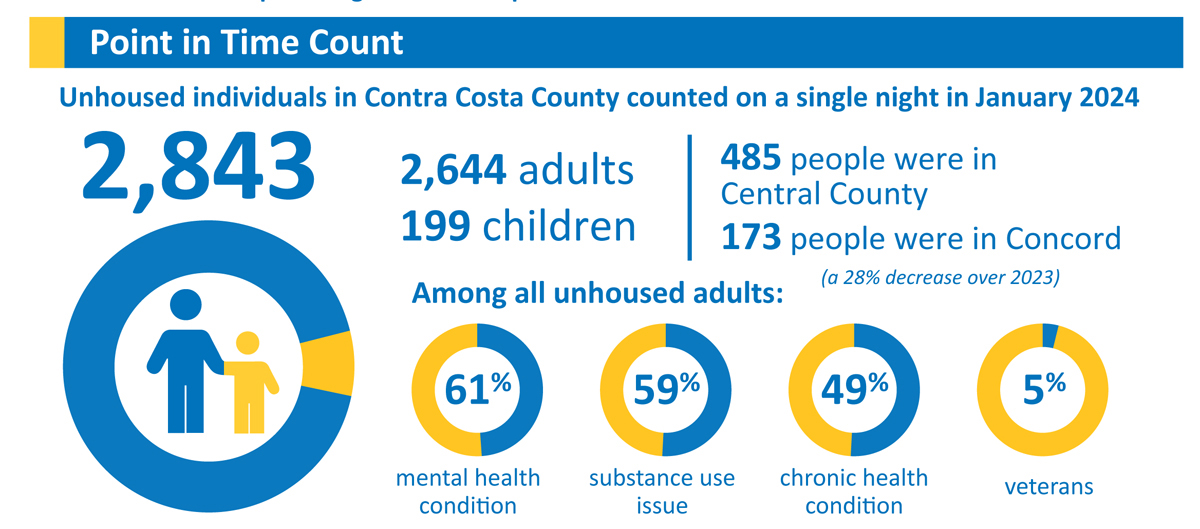One-time grant will offer homes, services for Concord’s unhoused

CONCORD – When a mobile unit complete with social workers and showers opens its doors in a few weeks to help house the city’s unhoused, no one will be more excited than Kelly Fossan-McKinley of GROW Concord.
The group was one of six local organizations to whom the City Council awarded a total of $5 million in one-time, non-recurring funding, after a unanimous vote to support the recommendations of Councilmembers Dominic Aliano and Laura Nakamura. The two made up an ad hoc committee to review grant proposals.
Additionally, they will deliver field-based services to people in their current sheltering locations, addressing essential needs such as medical care, substance abuse treatment, food, hygiene and workforce development. The goal is to support individuals by successfully exiting homelessness and achieving permanent housing.
Realizing a vision
GROW Concord received the biggest chunk of the grant, $1,705,000 for a Mobile Resource Unit.
“This grant will enable us to go to locations near where the unhoused are with social workers, medical providers, veterans services, showers and other items that will help people make the next step,” says Fossan-McKinley, a Clayton resident.
The unit will start at a church on Willow Pass and add another every three months – until there are three per week operating in Concord within six months.
“I couldn’t be happier to see this crazy vision of mine come together,” Fossan-McKinley says.
Deanne Pearn, CEO of Hope Solutions, feels the same way about an old motel in Concord that will offer a dozen rooms to the city’s unhoused, complete with services to help the residents.
With an award of $760,000, the motel is Pearn’s project. She says these “wrap-around” services are essential for helping unhoused individuals get on their feet again wherever they end up.
Hope Solutions’ share will go mainly toward renovations of the motel. It will also offer permanent supportive services, funded additionally by federal grants.
The other recipients were Caminar Rapid Rehousing with a $1,580,000 slice, Mobile Resource Unit with $1,705,000, NAMI Contra Costa’s Mobile Resource Unit with $200,000, the Northern California Family Center/ Scattered Site Interim Housing with $25,000 and Veterans Accession House/Scattered Site Interim Housing at $730,000.
“I’m thrilled with the grant support for the housing,” Pearn said. “We’ve been working with the motel owners for over a year, and they want the same thing we do: To assist the chronically unhoused people of Concord.”
Pearn says the group adheres to the motto “Housing First.”
“Once people have a roof over their heads, they can start putting their lives together.”
Boosting mental health, quality of life
Caminar is based in the South Bay but has satellite offices throughout the Bay Area, including Concord. The group will leverage their grant with landlords to help pay for housing for the area’s unhoused. They too adhere to the “Housing First” model, says LaTanya Johnson, director of the Concord efforts.
“The wrap-around services will certainly help our clients,” she said. That will include case management, help with employment and finding permanent housing if needed.
Mark Cloutier, CEO of Caminar, says the organization is geared toward better mental health for their clients and understanding issues that will enhance their quality of life.
“That obviously starts with permanent housing,” he said.
“We are even exploring shared housing experiences, where a homeowner with extra rooms in their house may rent them out to our unsheltered clients.”
Seven key strategies
Although the grants will be available this month, it took a few months to get here. In September, the city issued a request for proposals from organizations specializing in homeless response services. Seventeen organizations submitted proposals, and on Sept. 20, the ad hoc committee conducted public interviews with each applicant.
The committee then developed funding recommendations based on key attributes, including community benefits, goals and objectives, partnership and funding sources, and organizational capacity.
Concord’s Homeless Strategic Plan was developed over 11 months with significant community participation. It consists of seven core strategies:
1. Creating a Mobile Resource Unit.
2. Investing in rapid rehousing.
3. Development of scattered site interim housing.
4. Development of scattered site tiny homes.
5. Development of centralized tiny homes.
6. Securing interim motel housing.
7. Securing permanent supportive motel housing.
All strategies prioritize the immediate needs of those living unsheltered by focusing on connection to services and expanding housing options with support services.
Additionally, the City Council approved a $126,500 agreement with Homebase for grant monitoring and reporting services. This will enable the city to closely track the progress of each program and gather data to measure and report on the achievement, outcomes and goals of each organization.
By evaluating the effectiveness of the programs and the investments made, city leaders say Concord will be better positioned to promote future initiatives and provide valuable insights that could benefit other agencies or similar programs both at home and elsewhere.
“I’m looking forward to changing some lives,” Fossan-McKinley says.

Peggy Spear
Peggy Spear is a journalist and frequent contributor to the Pioneer.
